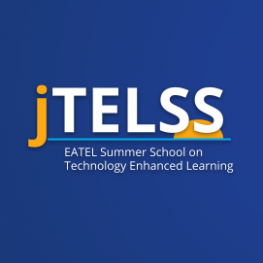Speakers
Miriam Calvera Isabal
Universitat Pompeu Fabra, SpainStart
26/05/2022 - 17:30
End
26/05/2022 - 19:00
Citizen science and SDGs to support the inspiration of science in education
Thursday 26/05 16:00-17:30h
Outdoor Area A
—
Thursday 26/05 17:30-19:00h
Outdoor Area A
Abstract
Citizen science (CS) promotes the active participation of citizens in scientific projects through the performance of scientific tasks or activities. CS and the Sustainable Development Goals (SDGs) are connected since there are many projects that are investigating issues related to any of the SDGs. Participation in citizen science could also change the attitude and behavior of the participants towards a specific topic and promote the development of scientific skills and learning. In this context, we are investigating how to (co)design and develop a digital tool to support the inspiration of science in education based on real open data from CS and SDGs. The purpose of this workshop is to co-design and co-evaluate a 1stprototype that is the result of a first iteration of co-design with teachers.
Learning about citizen science could make the participants see this perspective of doing science as a possibility for their own investigations. Furthermore, SDGs might also increase awareness about the objectives identified by united nations and be a source of inspiration. By participating in this workshop and being involved in the (co)design process, participants can learn about User-centered Design Methodology.
Needs Analysis
PhD candidates in TEL are being trained in the design and development of educational technology. For this reason, we consider that PhD students might be interested on leaning more about CS, SDGs and how to apply the DBR methodology and HCI techniques to design an Educational Technology.
For the development of the tool we decided to involve key stakeholders in the (co)design and evaluation of the tool. We think this workshop is an opportunity for us to learn more about TEL from PhD candidates’ experience and also to show them how we are approaching the design of the tool. In addition to that, they will be able to share their knowledge/experience as Learning technology professionals to help improve aspects of a specific educational technology. In this context, JTELS is a good opportunity for our research.
Learning Objectives
We would make participants reflect about how already existing Citizen science initiatives can inspire teachers to formulate learning activities. The participants will:
- Learn about how data from CS and the SDGs can be used with TEL purposes
- Learn about how to apply a DBR methodology
The main outcomes are:
- Data collected about the prototype evaluation and design process. This data will help us to better understand how tool should be designed and if the prototype presented has been well designed for the purpose of the research
- Conclusions obtained from the workshop might have implications to TEL theory
Pre-activities
We will share with participants introductory information about citizen science and the sustainable development goals. It won’t be mandatory to read all unless someone is interested in exploring further the subject of the workshop. There are no pre-requisites for participants. Everyone who is interested in TEL is invited to join the workshop.
Session Description
The workshop is divided into three parts:
- Introduction: Explanation of citizen science, SDGs and the research
- Individual work: paper prototyping. Tool design
- Prototype evaluation
During the introduction I will introduce the topic and the research. After this brief introduction, everyone will work on the tool design creating a prototype in paper. After it, during the sharing part we will discuss all the designs. A prototype has been created based on the data collected from previous workshops. In groups, they will explore and evaluate the prototype and analyze all functionalities.
This face to face workshop will allow participants to interact with each other. During the prototype evaluation in groups the participants will need a computer to explore the tool and to collect all the information shared during the brainstorming.
Post-Activities
A citizen science training course (https://openupsci.wixsite.com/citizensciencecourse)
- Fritz, S., See, L., Carlson, T., Haklay, M. M., Oliver, J. L., Fraisl, D., … & West, S. (2019). Citizen science and the United Nations sustainable development goals. Nature Sustainability, 2(10), 922-930.
- Hernández-Leo, D., Asensio-Pérez, J. I., Derntl, M., Pozzi, F., Chacón, J., Prieto, L. P., & Persico, D. (2018). An integrated environment for learning design. Frontiers in ICT, 5, 9.
- Vezzoli, Y., Mavrikis, M., & Vasalou, A. (2020, March). Inspiration cards workshops with primary teachers in the early co-design stages of learning analytics. In Proceedings of the tenth international conference on learning analytics & knowledge (pp. 73-82).
- Calvera-Isabal M, Santos P, Hernández-Leo D. Citizen science, data science and education: how to support teacher’s inspiration during the learning activities design with technology enhance learning. Paper presented at: Doctoral Consortium of the Sixteenth European Conference on Technology Enhanced Learning (EC-TEL); 2021 Sep 20–24, Bolzano, Italy.
- Calvera-Isabal M, Varas N, Santos P. Computational techniques for data science applied to broaden the knowledge between citizen science and education. In: Sampson DG, Ifenthaler D, Isaías P, editors. Proceedings of the 18th International Conference on Cognition and Exploratory Learning in the Digital Age (CELDA 2021); 2021 Oct 13-15; Lisbon, Portugal. Lisbon: IADIS Press; 2021. p. 219-26. http://hdl.handle.net/10230/49216

